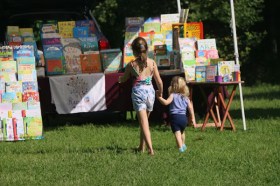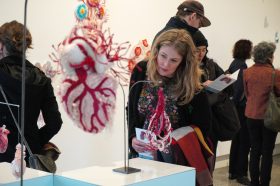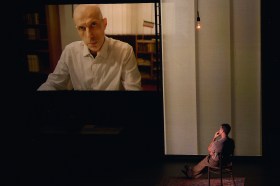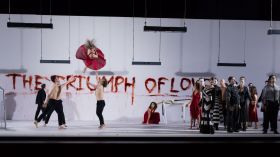APRIL is the cruellest month, breeding
Lilacs out of the dead land, mixing
Memory and desire, stirring
Dull roots with spring rain.
Early on, April seemed to defy T.S. Eliot‘s characterization of the month that begins with All Fool’s Day and then plunges most of us into a two-week agony of self-assessment — or at least self-accounting — as we scramble to complete our income tax returns by the 15th (17th this year).
April was National Poetry Month in the US, with festivals all over the land. April also hosted the fifth annual Tribeca Film Festival, the Boston Cyberarts Festival, the New Orleans Jazz & Heritage Festival, and the 24th annual Skagit Valley Tulip Festival. A festive month!
At Arts Hub US, we cranked up to two bulletins a week, with twice as much news, and added new features such as the Song of the Week and the Artist’s Voice, which in April introduced Madelon Galland and Emna Zghal. We also covered John Fugelsang’s new one-man show; evaluated the work of minimalist composers Philip Glass and Steve Reich, who turned 70 during the past year; surveyed the world-wide phenomenon of complaints choirs and profiled the upcoming hundredth festival by the oldest Bach Choir in the country; considered the legacy of Andy Warhol; and dropped in on the AIPAD photography show in New York.
And I can’t even begin to understand
what you’re going through…
— nanakojo
But the story that made this April live up to Eliot’s dictum was the Virginia Tech Massacre on April 16th, when senior English major Cho Seung-Hui shot dead 31 people and wounded 20 others before turning the gun on himself.
When it was discovered that Cho was a writer, his plays were published on the web, and the portrait they provided of the killer’s deranged mind was shocking, prompting many to wonder why no one foresaw the catastrophe to come. But, as his playwriting teacher said, “There is a huge difference between writing about violence and behaving violently,” and besides, as all who came in contact with Cho testified, everyone tried everything they could think of to get him help.
When the video and still photos Cho made were aired by NBC, this too created controversy over whether or not such publicity made matters worse. On the one hand, as NBC clearly felt, any evidence provided by the killer might help to understand what made him do it. But one media ecologist noted a troubling connection between guns and cameras in his blog: “We can therefore understand that the video and stills prepared by the Virginia Tech killer, and sent to NBC, was an assault by other means, another violent act prepared and perpetrated by a mass murderer,” he writes. “The intent, clearly, was not only to justify his actions, but to incite more violence by others.”
Two weeks later, investigators still don’t know why Cho launched his bloody attack. I suspect we’ll never understand it completely.
For some reason I cannot fully explain, this tragedy, if that’s what it is (it’s certainly a catastrophe), haunts me more than any others that I’ve known, either here or elsewhere in the world. It’s true that I have a slight connection with people directly involved; it’s true that for most of my adult life I’ve been a member of the academic community; it’s also true that recently becoming a grandfather has sharpened my feeling of how precious is the life of every single person.
I can’t go on. I’ll go on.
— Samuel Beckett
Among many benefits, the arts provide consolation, something creative to contemplate in the face of meaningless carnage. During April, I heard a thrilling concert by the Uri Caine Ensemble, who de- and then re-constructed Bach’s Goldberg Variations in jazz language; I saw a preview of John Fugelsang’s All the Wrong Reasons; I watched an old DVD of Christopher Nolan’s mind-bending Memento (2000), starring Guy Pearce, Carrie-Anne Moss, and Joe Pantoliano; attended the opening of Cynthia von Buhler’s Show and Tell; visited a friend’s studio in one of the youngest NYC artist neighborhoods, Gowanus in Brooklyn; and read three neat books: Galway Kinnell’s down-to-earth tranlation of The Poems of Francois Villon, Pauline W. Chen’s sobering Final Exam: A Surgeon’s Reflections on Mortality, and Jim Harrison’s odd but lovely novel Returning to Earth. (I also enjoyed watching opening games of the Major League Baseball season on TV.)
In May at Arts Hub US, we’ll see features that include an interview with Wikipedia founder Jimmy Wales; a report on the National Endowment’s American Masterpieces program to conserve dances by otherwise “lost” choreographers; a follow-up on ad-hoc choirs; an examination of the flowering (some would say infestation) of MFA programs in the arts; a look at arts marketing; a trip report on the Future of Electronic Literature conference at the University of Maryland; and a review of the new Greek and Roman exhibition at the Metropolitan Museum in New York. We’ll be introducing new writers, among them two presenters of Artist’s Voice features.
I look forward to your joining us.




